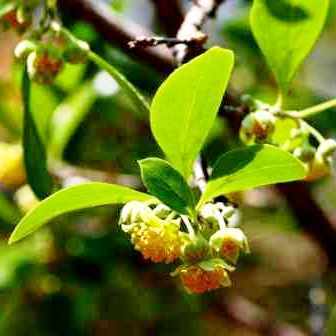Dovyalis zeyheri Seeds - Wild Apricot - Indigenous South African Edible Fruit from Africa
Check my rate
| Main centres: | 1-3 business days |
| Regional areas: | 3-4 business days |
| Remote areas: | 3-5 business days |
Product details
Common Name: Wild Apricot This is a tree with a most unusual and apparently unexplained feature. At certain times of the year the leaves emit a smell resembling that of carrion. It can be quite strong at times and could lead to a search for a dead animal in the vicinity. It is quite hard to believe that it is coming from a tree! The wild apricot is widespread and occurs in bushveld and woodlands especially in rocky areas. It also sometimes occurs in evergreen forest margins. This tree is found in the more eastern parts of South Africa and central and eastern Zimbabwe. The name Dovyalis is based on a Greek word meaning "spear'' and the specific name, zeyheri, is in honour of K.L.P. Zeyher, a German botanist who was active in South Africa in the early 19th century. Dovyalis zeyheri is a small to medium sized, evergreen tree growing from 2-13m. The stem can be single or multi-stemmed. The bark is a light grey-brown, it becomes rough and flaking on older trees. Young branches are covered with hairs and long, straight spines are usually present. These may reach up to 60mm in length and make this plant a good choice for planting along a perimeter to prevent intruders from entering. Spines are also a feature of Dovyalis caffra, the Kei apple, which is another member of this genus often grown as a barrier plant. These two plants are fairly similar, but the fruits of the Kei apple are yellow, roundish and slightly larger than those of D. zeyheri. The latter tends to grow into a tree, whereas the Kei apple usual remains bushy. D. zeyheri also occurs naturally further north than D. caffra which is centred in the Eastern Cape region. The leaves of D. zeyheri are glossy, dark green, alternate and have a leathery texture. Young leaves are soft and velvety. The flowers are small and greenish yellow. Male and female flowers are borne on separate trees from August to December. The fruits are found only on female trees. They are bright orange and oval in shape with a velvety texture. They reach up to 25mm long and appear from November to May. The wild apricot is a good tree for wild fruit, the taste is sour but refreshing and is eaten by people and animals. The fruit makes a good jelly but some sweetening is required. Birds such as barbets, louries, hornbills and mousebirds relish the fruit. The thorns which provide protection for birds' nests, along with the fruit make this an excellent wildlife garden tree. In the wild it is often found growing on termite mounds in areas where the soil has a high clay content. The caterpillars of the African Leopard Butterfly (Phalanta phalantha) feed on the leaves. The bid amount is for 1 Seed We'll supply you with all the germination & care instructions. |




